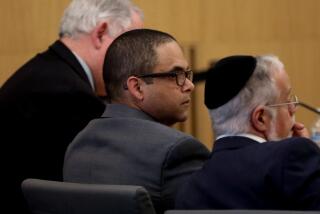Reactions to verdicts reflect city’s diversity
- Share via
Long Beach city officials were prepared for the worst. The judge’s pronouncement was deliberately set for Friday afternoon, after high schools had been dismissed for the week. Dozens of police officers lined the courtroom, courthouse hall and streets. Schools and parks drew stepped-up patrols. A community forum was set for this morning to give residents a chance to safely vent.
But the verdicts in the hate-crime case -- nine of 10 black youths on trial held responsible for the Halloween beating of three young white women -- landed softly, triggering relief in some quarters, resignation in others and a sense of sadness that transcended neighborhood boundaries in a city that prides itself on diversity.
“This was a catastrophe for everyone involved,” said Ann Schoendienst, a retired schoolteacher who has lived for 25 years less than a block from where the beating occurred. “You think those three victims will ever forget this? They won’t. Neither will the doers....
“This is very distressing to everyone,” she said. “Long Beach is a very diverse city. This has set us back.”
Among some of her neighbors in Bixby Knolls -- an island of affluence in the mostly working-class city -- there was a sense of vindication.
“I was not expecting this at all,” said Traci Ortiz, who applauded the verdicts. “I thought they were going to walk.”
Bixby Knolls was frightened and shocked by the explosion of violence amid the Halloween night revelry that had been a neighborhood tradition since World War II. The judge’s ruling sent a message to the teenage mob that marred the celebration, Ortiz said, “about being responsible for your decisions.”
A few miles away, in the working-class area around Polytechnic High School -- the school several of the youths attended -- residents suggested that the deck had been stacked against the accused from the start.
“If you’re black kids fighting white kids in a white neighborhood, you’re done,” said Laron Mike, 33, who is black. “That was their big mistake; they shouldn’t have been up there in the first place.”
City officials -- accused by some of being slow to respond to the crime and by others of overreacting -- moved quickly Friday to cast the judge’s decision as a healing force, a way for Long Beach to close an ugly chapter and move forward.
“Maybe it will serve as a wake-up call to everybody,” said Councilwoman Rae Gabelich, whose district includes Bixby Knolls -- the Virginia Country Club area of multimillion-dollar homes -- and three subsidized housing projects for low-income families.
“I don’t know the kids involved,” she said. “I know that many of them come from good families. I know there’s an array of backgrounds
Across Long Beach, reactions reflected the divisions of a city that is 36% Latino, 33% white, 14% black and 12% Asian American, and includes a patchwork of working-class neighborhoods, middle-class and wealthy enclaves and bustling seaside redevelopment projects.
Some saw the trial as a naked display of the city’s social and racial tensions, the verdicts a reflection of middle-class fears about crime and gangs. “They’re all members of the same club,” the grandfather of one defendant said of the judge and prosecutors. “These kids are actually lucky. They used to hang blacks for this kind of thing.”
When news of the Halloween beating broke, outrage was strong and universal. But as the trial unfolded, views diverged: Was it a hate crime or a teenage brawl that got out of hand?
“If a beating like that happened around here, people would have said, ‘Oh, that’s normal,’ ” said Romie Walker, 27, a youth counselor who also works the counter at a beauty salon a block south of Poly High.
“This was not a hate crime,” he said. “In a neighborhood like this, you say the wrong thing, and somebody’s gonna go off.”
But not everyone agreed that there was a racial element in the way case played out.
“People are trying to play the race card,” said Chandra Sheppard, a black special education teacher who lives in North Long Beach. “Take the race out of it. You have people who put their hands on other people; wrong is wrong. They had no business doing what they did. It’s not a race thing; you have no right to make other people feel unsafe.”
jessica.garrison @latimes.com
Times staff writers Sandy Banks and Tami Abdollah contributed to this report.
More to Read
Sign up for Essential California
The most important California stories and recommendations in your inbox every morning.
You may occasionally receive promotional content from the Los Angeles Times.











